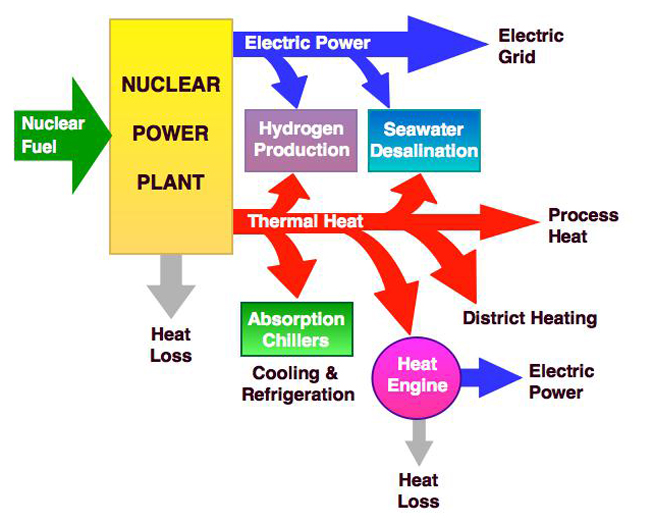Industrial applications and nuclear cogeneration
Cogeneration is the integration of nuclear power plants with other systems and applications. The heat generated by the nuclear power plants can be used to produce a vast range of products such as cooling, heating, process heat, desalination and hydrogen. The use of nuclear energy for cogeneration provides many economic, environmental and efficiency-related benefits. Cogeneration options may be different; depending on the technology, reactor type, fuel type and temperature level.

The use of nuclear energy for cogeneration also provides the benefit of using nuclear fuel in more efficient and eco-friendly manner. Energy and exergy analyses show that the performance of a nuclear power plant may be increased if it is used in a cogeneration mode. The use of nuclear energy for cogeneration applications can also lead to a drastic reduction in the environmental impact. However, integrating nuclear power plant with any other sub-system for cogeneration can greatly be affected by the performance parameters of the nuclear power plant and the site where it is situated.
There are major types of nuclear power reactors such as: the light water reactor (LWR), heavy water reactor (HWR), small modular reactor (SMR), liquid metal fast reactor (LMFR), high temperature gas reactor (HTGR), supercritical water reactor (SCWR), gas fast reactor (GFR), molten salt reactor (MSR) and modular helium reactor (MHR). LWR, HWR and SMR are suitable for use in district heating and desalination systems due to their working temperature range of 280-325°C. The working temperature range of other types including LMFR, HTGR, SCWR, GFR and MHR are from 500-800°C makes them suitable for various cogeneration options. The high working temperature range of 750-950°C of HTGR using helium as a coolant makes them suitable for generation of process heat and hydrogen in cogeneration mode. The working temperature ranges of SCWR (430-625°C), GFR (~850°C) and MSR (750-1000°C) make them suitable for production of hydrogen, process heat and desalination of sea water when they are used as cogeneration systems.
Other potential area of process heat applications of nuclear power which of interest to Member States and supported by the Agency is the oil sand/oil shale extraction and enhancement of oil recovery (such industrial applications have been applied in Canada, Switzerland and India).


